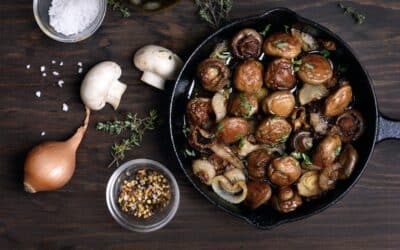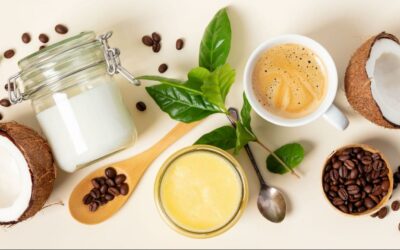Soy has been lauded, soy has been vilified, but mostly, soy has been wildly misunderstood, prompting a deluge of misinformation, disseminated in seeming perpetuity. In the entire history of the world, few foods have incited such fierce debate, among layman and expert alike, as this simple legume. Fortunately, we’re here to set the record straight, and put to rest, finally, years of false information surrounding this polarizing, yet wholesome bean.
Myth #1: Soy sets the stage for prostate cancer.
Let’s not waste time on the endless confusing lay media articles on soy and prostate health. Instead, let’s jump right to a reputable source, a source that health professionals trust to inform their work. The National Cancer Institute of the National Institutes of Health (NIH) reviews relevant, current studies on soy and prostate health (1). Let’s zero in on the human studies they share (not test tube or mouse studies) exploring the relationships between soy food and beverage consumption (not isolated soy components or supplements) on prostate cancer. Here are the key takeaways from these studies:
- Populations that consumed unfermented soy foods (e.g., tofu) and beverages (e.g., soymilk) experienced lower prostate cancer risk (2). Fermented soy foods (e.g., tempeh, miso) seemed neutral, linked to neither higher nor lower risk.
- One randomized placebo-controlled trial used soy food. In a study of men who had been diagnosed with prostate cancer, researchers found that men who ate four slices of soy-rich bread per day experienced improvements in two important lab values (PSA level and free/total PSA ratio) compared to those eating regular wheat bread (3).
- Several clinical trials examined the role of soy milk or soy-based bread in prostate cancer patients with recurrence after treatment (4-7). No significant changes in PSA or PSA-doubling time were observed (4-6), though one study found other favorable changes (e.g., improved measures of inflammation and immune function) (7).
As you can see, results were favorable in some studies and non-significant in others. Soy foods and beverages were well-tolerated, even by high-risk prostate cancer patients, and they didn’t increase the risk of prostate cancer or accelerate disease progression in even a single human study presented by the NIH in their debrief to health professionals (1). In other words, men can confidently consume soy without fear that they’re setting themselves up for prostate cancer. If anything, soy could protect them from it.

Myth #2: Soy feminizes men by dropping their testosterone and giving them breasts.
Cherry-picking a few papers to make the case that soy emasculates men is easy. Watch this: Two studies could be used to argue that men eating soy flour (8) or soy protein powder (9) decreased their testosterone levels. A case report could then be used to link soy milk to enlarged breasts (10). True, a case report is the lowest form of scientific evidence, and the man in the paper drank three quarts of soymilk a day, but to make this case, let’s overlook those details. Ignoring the research on rodents and supplemental soy extract pills, we’ve got three scientific papers to stand behind.
Now let’s consider all of the evidence exploring what happens to testosterone levels when men eat soy foods (e.g., tofu), drink soy beverages (e.g. soy milk), or consume soy protein powders (e.g., soy protein isolate). The two studies mentioned above connecting soy to low testosterone included a total of 32 subjects (8,9). Compare this with a meta-analysis published last year that looked at 24 studies of 1,024 subjects consuming these very foods, drinks, and supplements (10). What did this extensive study of studies find? Even at high doses, soy didn’t affect mens’ levels of bioavailable testosterone, or estrogen for that matter.
Estrogen did increase, however, in the case report where the man drank loads of soy milk (11). Keep in mind that anything can happen when a single random person does something extreme. More importantly, what happens when hundreds of people act more moderately? Two different randomized, double-blind placebo-controlled clinical trials including a total of over 500 men and lasting three months to three years, explored the effects of soy on breast tissue in men (12,13). Neither study found even a shred of evidence to bolster the claim that soy causes men to grow breasts (19).
Cherry picking a few papers to generate sensational headlines with potent click-bait is profitable, but it confuses people with bad information. In reality, these drops of water are swallowed by an ocean of robust research that shows us, with no uncertainty, that soy does not feminize men in any way, shape, or form.

Myth #3: Soy protein doesn’t build strength or muscle like meat, milk, or whey protein.
It’s beyond commonplace to disparage the quality of plant protein relative to animal protein. Despite multiple limitations with the scoring system used to make this comparison (14), the protein quality of soy milk (15) is actually greater than that of 80% ground beef (16) using this same scale. It should come as no surprise then, that a meta-analysis including nine clinical trials found that beef and soy protein promote similar improvements in strength and muscle mass in response to weightlifting (17). The same study pitted soy protein against milk and whey protein too, and again, there were no differences in gains. Popular media outlets highlight “fact checked” takeaways like “Whey Beats Soy for Muscle Building” (18) based on short-term studies lasting four hours or so, but material gains accrue over days, weeks, and months (19). And the verdict from these studies is clear: When you get enough protein, meat, milk, and whey are no better than soy for building strength and muscle mass (17).
In conclusion, soy can be a wonderful addition to a balanced diet. So the next time you pour yourself a chilled glass of frothy soy milk, or make a breakfast burrito with perfectly seasoned tofu scramble, or eat a delightful garlic edamame appetizer at your local izakaya, take comfort in knowing what soy could be doing for your health, and the health of your loved ones.
Learn even more about soy and its wonderful health benefits.
References →
(1) National Cancer Institute, National Institutes of Health. Prostate cancer, nutrition, and dietary supplements (PDQ®)–Health professional version. Accessed on Sept 20, 2022 at https://www.cancer.gov/about-cancer/treatment/cam/hp/prostate-supplements-pdq.
(2) Applegate CC, Rowles JL, Ranard KM, et al. Soy consumption and the risk of prostate cancer: An updated systematic review and meta-analysis. Nutrients. 2018;10(1): 40.
(3) Dalais FS, Meliala A, Wattanapenpaiboon N, et al. Effects of a diet rich in phytoestrogens on prostate-specific antigen and sex hormones in men diagnosed with prostate cancer. Urology. 2004;64(3): 510-515.
(4) Kwan W, Duncan G, Van Patten C, et al. A phase II trial of a soy beverage for subjects without clinical disease with rising prostate-specific antigen after radical radiation for prostate cancer. Nutr Cancer. 2010;62(2): 198-207.
(5) Pendleton JM, Tan WW, Anai S, et al. Phase II trial of isoflavone in prostate-specific antigen recurrent prostate cancer after previous local therapy. BMC Cancer. 2008;8: 132.
(6) Bosland MC, Kato I, Zeleniuch-Jacquotte A, et al. Effect of soy protein isolate supplementation on biochemical recurrence of prostate cancer after radical prostatectomy: A randomized trial. JAMA. 2013;310(2): 170-178.
(7) Lesinski GB, Reville PK, Mace TA, et al. Consumption of soy isoflavone enriched bread in men with prostate cancer is associated with reduced proinflammatory cytokines and immunosuppressive cells. Cancer Prev Res (Phila). 2015;8(11): 1036-1044.
(8) Gardner-Thorpe D, O'Hagen C, Young I, et al. Dietary supplements of soya flour lower serum testosterone concentrations and improve markers of oxidative stress in men. Eur J Clin Nutr. 2003;57(1):100-106.
(9) Goodin S, Shen F, Shih WJ, et al. Clinical and biological activity of soy protein powder supplementation in healthy male volunteers. Cancer Epidemiol Biomarkers Prev. 2007;16(4): 829-833.
(10) Martinez J, Lewi JE. An unusual case of gynecomastia associated with soy product consumption. Endocr Pract. 2008;14(4): 415-418.
(11) Reed KE, Camargo J, Hamilton-Reeves J, et al. Neither soy nor isoflavone intake affects male reproductive hormones: An expanded and updated meta-analysis of clinical studies. Reprod Toxicol. 2021;100: 60-67.
(12) Sathyapalan T, Rigby AS, Bhasin S, et al. Effect of soy in men With type 2 diabetes mellitus and subclinical hypogonadism: A randomized controlled study. J Clin Endocrinol Metab. 2017;102(2): 425-433.
(13) Fleshner NE, Kapusta L, Donnelly B, et al. Progression from high-grade prostatic intraepithelial neoplasia to cancer: A randomized trial of combination vitamin-E, soy, selenium. J Clin Oncol. 2011;29(17): 2386-2390.
(14) Craddock JC, Genoni A, Strutt EF, et al. Limitations with the Digestible Indispensable Amino Acid Score (DIAAS) with special attention to plant-based diets: A review. Curr Nutr Rep. 2021;10(1): 93-98.
(15) Reynaud Y, Buffière C, Cohade B, et al. True ileal amino acid digestibility and Digestible Indispensable Amino Acid Scores (DIAASs) of plant-based protein foods. Food Chem. 2021;338: 128020.
(16) Fanelli NS, Bailey HM, Thompson TW, et al. Digestible Indispensable Amino Acid Score (DIAAS) is greater in animal-based burgers than in plant-based burgers if determined in pigs. Eur J Nutr. 2022;61(1): 461-475.
(17) Messina M, Lynch H, Dickinson JM, et al. No difference between the effects ofsupplementing with soy protein versus animal protein on gains in muscle mass and strength in response to resistance exercise. Int J Sport Nutr Exerc Metab. 2018;28(6):674-685. doi:10.1123/ijsnem.2018-0071
(18) McNight C. Soy protein vs. whey protein. Livestrong. Accessed on September 23,2022 at: https://www.livestrong.com/article/17876-soy-protein-vs.-whey-protein/.
(19) Messina M, Duncan A, Messina V, et al. The health effects of soy: A reference guide for health professionals. Front Nutr. 2022;9: 970364.








